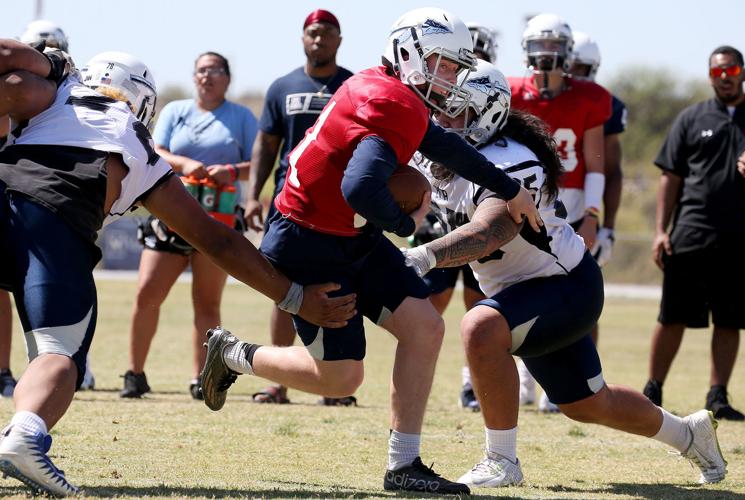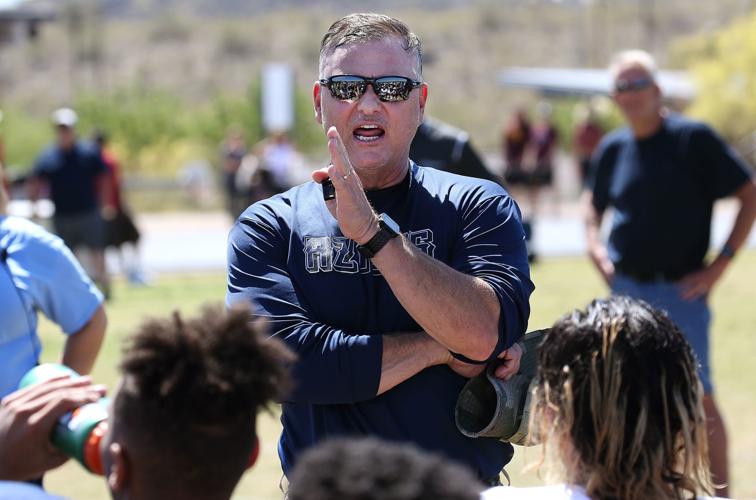From the time he got home from Wednesday night’s Pima County Community College Governing Board meeting to the time he met the media Thursday morning, Pima Chancellor Lee Lambert said he didn’t receive a single call, text or email about his decision to eliminate the Aztecs’ football program.
Athletic director Edgar Soto, on the other hand, was swamped with both calls and texts. The response wasn’t what Soto — or most fans — would have expected.
“Not in the way you might think, as far as angry or anything. More so, as, ‘Hey, we understand it’s a tough decision,’” Soto said Thursday morning. “I have received a lot of phone calls, actually, a lot of texts, not emails, but just more so them understanding the challenges we have.”

Quarterback Caleb Ryden finds a hole during the Pima College spring football game in April. The 2018 season will be the Aztecs’ last after PCC officials approved a new $1.9 million annual budget.
Lambert and Soto decided Wednesday night to eliminate the school’s football program, in part to reach the school’s annual budget goal of $1.9 million, and spurred on by Maricopa County’s decision to do the same starting in 2019.
Pima will also eliminate two golf or tennis programs in the coming months; Soto will announce which programs he will cut — the Aztecs have men’s and women’s teams in both sports — by January.
There was more behind their rationale, too. Lambert said Pima’s enrollment numbers have declined over the last decade, prompting a three-year plan to lower the school’s budget by $5 million per year.
The athletic department was scheduled to make its cut next year, but the Maricopa County Community College District’s decision to eliminate football from their four colleges prompted Pima to act faster.
“I think it’s very important that we do not lose sight that the college is facing a tremendous amount of challenges and pressures, historically, that are having us consider some very difficult decisions,” Lambert said. “Our enrollment has been declining for a period of time. This year, fortunately, for the first time, our enrollment is up. But because of the enrollment challenges, it impacts other assets of our operation — and athletics is not immune to that.”
Lambert said the decision to eliminate football was tough, even though the program costs $500,000 annually and the team would have to scramble to find opponents with the Phoenix schools out. Lambert was planning to play college football before a grisly leg injury — and three subsequent surgeries — forced him to the sidelines. The University of Puget Sound had been recruiting Lambert as a running back, and honored its scholarship offer even though he was hurt. Lambert spent one year there before joining the Army.
“I still would have gone to college regardless of whether football was an option or not,” Lambert said. “But it was because of football that I saw higher education as a critical option for me, and I know that’s true for lots and lots of young boys and young men in our community, across the country.
“So, this is personal to me and also it hurts deeply that we’re no longer going to be able to offer this option for the 100 young men that were going to be playing for Pima Community College.”
Lambert said Pima will continue to offer scholarships to football players still on Pima’s roster in 2019. The same goes for the golf and tennis players.
“These are the students we may identify as maybe they were All-City, their coaches recommend them, their teachers recommend them and they need an opportunity to go to college and have some scholarships set aside for them,” Soto said. “We still have an opportunity to get their foot in the door in college.”






